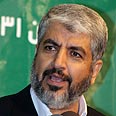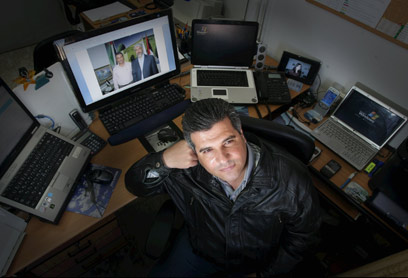


When you're the military correspondent for Jane's Defense News in the Middle Eastern arena, these flights becomes part of your job.
Najib, who lives in the village of Arura in northern Ramallah, is the only Arab military correspondent not just in the Palestinian Authority but in the entire Arab world. Thanks to this job, he is one of the only people who are warmly welcomed at military conventions in Arab countries and highly regarded by senior Israeli defense officials as well.
Surprisingly, his resume does not include any military training. When he was in high school, during the first intifada, he threw stones like his other classmates, and when he was 16 he spent some months in jail – but he never held a rifle or a gun and was never a member of any military organization.
His knowledge comes mostly from professional literature and military documentary films which he watches regularly. "In all my years as a military correspondent there has not been one complaint against my reliability," he boasts.
His desk is packed. A large computer screen in the middle and two laptops on both sides. Another, smaller laptop is located on the right-hand side of the table. "It's the computer with the Hebrew keyboard, which I use to read Ynet," he says. There is also a shining blue palmtop, a black laser printer and a digital scanner.
In the center of all this high-tech equipment sits Najib in a black leather jacket, the kind which used to be popular among World War II pilots. "This isn't a journalist's office," he says in fluent Hebrew. "It's an operations room."
In Khaled Mashaal's living room
Najib began his journalistic career in east Jerusalem, as a human rights reporter for the an-Nahar daily and later as an investigative reporter for Palestinian dailies. In 1996 he applied for communication studies at Birzeit University, and wrote his final paper with the help of Yedioth Ahronoth's correspondent on the territories.
He later worked as a reporter for the Jerusalem Post, becoming the first Palestinian living in the territories to work in Israeli print media. In 2001, after a three-month trial, he was hired by Jane's Information Group.

Fond of the Kfir Brigade. Najib in his office (Photo: Alex Kolomoisky)
He travels often to military and security-related events in the Arab world, including the Dubai Air Show, the Abu Dhabi Expo, and exhibitions in Jordan, Kuwait and even Saudi Arabia.
Israel is also within his coverage, despite difficult accessibility problems: He does not have a permanent entry permit or a press card on behalf of the Government Press Office, which usually provides easier access to the IDF. "And still, I receive cooperation and get military and security information about Israel," he says.
As part of his job, Najib is up to date on everything taking place in Israel. He watches the Israeli daily news editions, reads newspapers and listens to the radio.
"I'm the only Yedioth Ahronoth subscriber in Ramallah," he laughs. "My radio is always tuned on Army Radio, and I have good friends among the military correspondents. When needed – they help."
On a cork board above his desk, next to a picture of an assault helicopter, is a Yedioth Ahronoth newspaper clip about the "My favorite military unit" campaign held recently. "Oketz, the canine special forces. I don't really like them," he says.
What about Sayeret Matkal?
"I wrote an extensive piece about them after the Second Lebanon War."
He is fond of the Maglan special force unit, knows a little about Air Force commando unit Shaldag, but his choice – in case you're wondering – is the Kfir Brigade. "It operated in the territories and moved to the northern border. I'm interested in writing about them."
I didn't ask if he donated any money to the brigade through Army Radio's annual fundraising event.
In the 11 years of his career, Najib has met with a surprising list of Israeli defense officials, who he names at the pace of a machine gun.
"I recently met with Brigadier-General Yoav (Poly) Mordechai). Six years ago I visited the Ground Forces school in the Negev as the guest of Colonel Kobi Barak, who was the school's commander at the time. I interviewed Brigadier-General Yossi Kuperwasser when he served as head of the Military Intelligence's Research and Assessment Division. He told me, 'I can't believe you're a Palestinian from Ramallah.'
"In recent years I have also had work relations with Colonel David Hacham, who was the defense minister's advisor. I met with Brigadier-General Nitzan Alon when he was the Samaria commander, and before the Gaza evacuation I even met with (former Central Command chief) Major-General Gadi Shamni. I was the first Palestinian to interview him."
Najib also met with Avi Ashkenazi, the brother of outgoing IDF Chief of Staff Gabi Ashkenazi, while he commanded one of the Gaza units, spoke to several Air Force commanders, met with Major-General Giora Eiland and with Colonel Itamar Yaar of the National Security Council, and was even briefed about the Iranian threat by former Deputy Mossad Director Ilan Mizrahi.
Three weeks ago, he met with Knesset Member Shaul Mofaz (Kadima), a former IDF chief of staff. "I heard from him about his new peace plan," he giggles.
But one of his major journalistic achievements is undoubtedly an interview with Hamas politburo chief Khaled Mashaal, which many journalists dream of. And it wasn't simple, as it's very difficult for a Palestinian from Ramallah – including a journalist – to reach Damascus.
"It's easy to arrange an interview in Damascus, even with Khaled Mashaal. The problem is getting a visa," he explains.
Eventually, after receiving a visa with the help of members of the Syrian Ba'ath party in Ramallah, Najib traveled to Damascus in early July. He toured the city for about a week, used every possible contact, and finally reached one of Mashaal's people.
"You won't get an interview in one day," the man stated. "Go back to Ramallah, and we'll let you know when." Najib tried to be polite. "What should I bring you from the homeland?" he asked. "Elite black coffee," Mashaal's assistant replied.
Two weeks later, in the evening hours, the phone call came: "The interview is being scheduled for tomorrow."
With the crack of dawn he traveled from Ramallah to the Allenby Bridge, reached Amman and took a taxi to Damascus. "I wrapped the coffee to conceal its odor so that they wouldn't discover that I have coffee from Israel," he says.
After a strict security check he was taken into the living room in Mashaal's house, which has a large picture of the al-Aqsa Mosque on its wall, alongside portraits of Hamas founders Sheikh Ahmed Yassin and Abdel Aziz al-Rantissi, who were assassinated by Israel. A pile of fresh fruit was placed on the table.
"During the interview, when I wanted to take pictures, I took a few steps back from the desk. Mashaal's head was peeking from between the fruit, but one of the assistants asked me not to take the photo that way, because 'anyone who saw the pictures would think he was a greengrocer."
Were you excited?
"I stop thinking about the first minute of the meeting. I asked myself whether I should settle for a handshake or the common greetings. But the moment Mashaal walked into the room, the ice was broken. He called out, 'Ahlan wa sahlan' (welcome) as if we had known each other for years, and then walked towards me with his arms wide open, hugged me and kissed me on the cheeks."
The interview lasted four hours. Mashaal, says Najib, answered the difficult questions in detail. "When we reached the questions about (kidnapped soldier) Gilad Shalit, I pulled out a letter written to him by peace activist Gershon Baskin. I told him, 'This is a letter from Israel.' Mashaal smiled and replied, 'I'm not even allowed to touch it. I don't accept letters from Israelis. It's impure.' He asked me to read to him what it said."
Did you ask him what was holding up the deal?
"Yes. He said Hamas would not release Shalit unless the heavy price it was demanding was accepted, and added that he couldn't understand the Israelis. 'Why did they negotiate with Hezbollah and approve a swap deal with them but are saying no to us?'
"I also asked him what he thought about Israel's force, and he said it wasn't as strong as it used to be. 'In the Gaza war (Operation Cast Lead) they didn't defeat us,' he said, adding that the Israeli society was different too, that the Israeli Left had no influence anymore."
But Mashaal was also vague on some issues. When asked by Najib which countries supported Hamas financially, he replied that "only God knows. Even those transferring us the money don't know where it originates. All the security organizations want to know the source of the money, and God willing they won't know."
Knowing the Mossad chief
When it comes to a motivated person like Najib, it's not surprising to learn that his interview with Mashaal is not the peak of his career as far as he is concerned. His new study project is Mossad Director-designate Tamir Pardo, on whom he has been collecting every available piece of news.
"I know a lot about (outgoing Mossad Director) Meir Dagan," he says. He is also waiting for an interview with Central Command Chief Avi Mizrahi.
When I ask him about his journalistic dream, Najib replies without hesitating: "To interview Shin Bet Director Yuval Diskin."
Why?
"He is a very interesting character. He is professional, well aware of the Palestinian reality, his opinions are not radical and he has a special personality. I find it hard to understand how, despite the strained diplomatic relations between Israel and the Palestinian leadership – Israel manages, thanks to Diskin, to maintain a very good relationship with the Palestinian security organizations. Diskin is the only one who can give me the answer."
- Follow Ynetnews on Facebook















